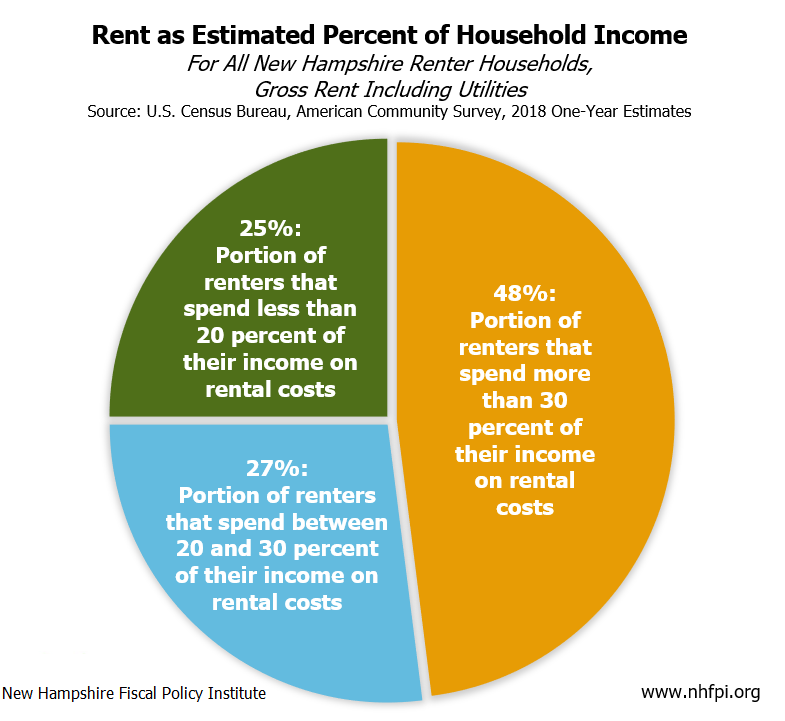On June 11, Governor Sununu appropriated $35 million in federal assistance to a new program designed to help residents keep their existing housing or secure permanent housing, providing critical support when many people have lost regular income during the COVID-19 crisis. This support comes as the Governor announced the current moratorium on evictions and foreclosures will expire July 1, 2020, increasing the risk of Granite Staters losing their homes.
Prior to the COVID-19 crisis, housing costs in New Hampshire were high, particularly for renters, who have median incomes less than half of the median income for homeowners in the state. Nearly half of all Granite State renters owed more than 30 percent of their household incomes for rent and utilities in 2018, which the U.S. Department of Housing and Urban Development identifies as the threshold at which housing becomes a “cost burden.” With the economic impacts of the COVID-19 crisis disproportionately falling on people with lower incomes and limited means, and surveys from both the U.S. Census Bureau and the University of New Hampshire suggesting nearly half of households in the state have experienced a loss of income or employment during the crisis, both renters and homeowners were in considerable danger of losing housing due to an inability to pay monthly bills.
To avoid the displacement of many people from their homes, Governor Sununu issued Emergency Order #4 on March 17, putting a temporary prohibition on evictions and foreclosures. Subsequently modified by Emergency Order #24, this prohibition on most evictions and foreclosures originally would have been suspended for the duration of the State of Emergency. However, on June 11, Governor Sununu issued Emergency Order #51, which repeals the temporary prohibition effective July 1. The Order also increased a minimum seven-day notice period for evictions to 30 days, giving those who have been evicted more time to vacate the properties.
The emergency orders prohibiting evictions did not require property owners to forgive rents, so renter households face the prospect of paying back rents once the eviction prohibition is lifted. The New Hampshire Housing Finance Authority estimated that renters were twice as likely as homeowners to have lost their jobs due to the COVID-19 crisis, and that many renter households in the state may not be able to pay some or all of their rent as a result. Even with income supports from the federal government, about one in ten adults in New Hampshire reported to the U.S. Census Bureau that they missed last month’s rent or mortgage payment or had slight or no confidence that their household can pay next month’s rent or mortgage on time. With the potential for backlogged bills looming, the risk for decreases in housing security is high.
To reduce this risk, Governor Sununu established the New Hampshire Housing Relief Program. This Program will provide one-time assistance grants, not to exceed $2,500, for households that had past-due rent from April 2020 forward and lost income or saw increased expenses as a result of the COVID-19 pandemic, with certain other allowable household-related or one-time expenses also permitted. The Program will also provide short-term rental assistance for permanent housing, including for past-due rent and ongoing assistance that will decrease over time as households regain stability, or for the transition of working households from shelters into permanent housing. The Program will operate through New Hampshire’s five Community Action Program agencies, which have experience with other emergency housing funds and with connecting people to services.
The Program is funded with a $35 million appropriation from the federal Coronavirus Aid, Relief, and Economic Security Act funding available to the state through the Coronavirus Relief Fund. Initially, $20 million will be deployed, with $15 million held in reserve.
With secure housing having a significant impact on the ability of individuals and families to engage with the workforce, access services, and provide stability for their children, helping ensure housing insecurity does not become more widespread due to the expiration of the temporary eviction ban is key. Many renter households had difficulty finding and affording a place to live before the COVID-19 crisis. The $35 million appropriation will help bolster housing security in New Hampshire, and policymakers should actively evaluate and assess whether more assistance is needed as the eviction ban is lifted.
– Phil Sletten, Senior Policy Analyst

